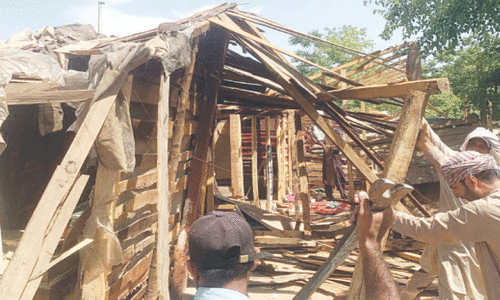ISLAMABAD: An event titled ‘Covid-19: women empowerment and way forward’ was held at Nomad Gallery on Sunday, featuring an art and craft exhibition, live mural painting, poetry recitation, dance and mime performances.
Under the 16 Days of Activism campaign against gender-based violence, the event was organised to highlight increasingly pervasive misconduct, harassment, derogatory remarks, abuse and violence faced by women in workplaces, residences, public places, schools and college campuses across the country.
Nageen Hyatt, director of the gallery and community centre, said people must be educated about this social menace as cases of violence against women and girls had increased by 25pc following the pandemic.
Nomad Gallery has been closed since the pandemic but it has been organising activities including pop-up shows online and on social media to support artisans and artists, Ms Hyatt said, adding that this event was organised by the gallery after a six-month break.
Although ‘equal rights to all citizens’ is written in the Constitution, these principles are not exactly followed, achieved or even implemented in the country, she said, adding that the rights of women, children, the vulnerable and marginalised segments of society were violated with impunity.
“We feel that art and artists must survive and give hope and smiles to the people who are compelled to live in a stressful and suffocated environment facing socio-economic strains, depression and anxiety,” said artist and writer Samia Aslam.
Abrar Ahmed’s paintings - Oil on Canvas - represented suffocated environments faced by working women and housewives due to the pandemic. Accessories worn by the two women in one of his works symbolise their lives, however, the environment they are surrounded by is the exact opposite, said the curator of the show, adding that the use of bright colours showed
the painter’s hope and positivity.
Ahmed Habib’s paintings Isolation and Waba Ke Din were based on a poem he wrote.
Calligrapher Riffat Khattak in his work has portrayed moods of the pandemic using calligraphy.
Senior artist Samina Ali Akhtar’s four miniature paintings, done in mixed media, represent the oppression of women in Mughal courts.
Farah Mehmood and Aimon’s (Saima Salahuddin) collaborative series You Are Served depict domestic violence, anxiety and resilience of women during the pandemic.
Short-story writer, singer and painter Samia Aslam’s painted red roses and birds using different mediums, symbolising hope amidst suffering and despair.
Michelle Gallope, vice-president of Asian Study Group, recited a poem by Harris Khalique and two poems from the book The Voices of Women.
Samia Aslam, while sharing her own experience, read a short story depicting difficulties that people had gone through in their relationships during the lockdown. Akhundzada Isfandyar Khattak gave a Kathak performance.
Sohaina Elia, daughter of noted poet John Elia, recited a poem by Fehmida Riaz.
Sadia Bukhari, journalist and human rights activist, recited two poems written by George Gordon Byron, dedicated to the late Asma Jahangir.
Published in Dawn, December 7th, 2020














































